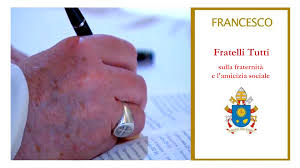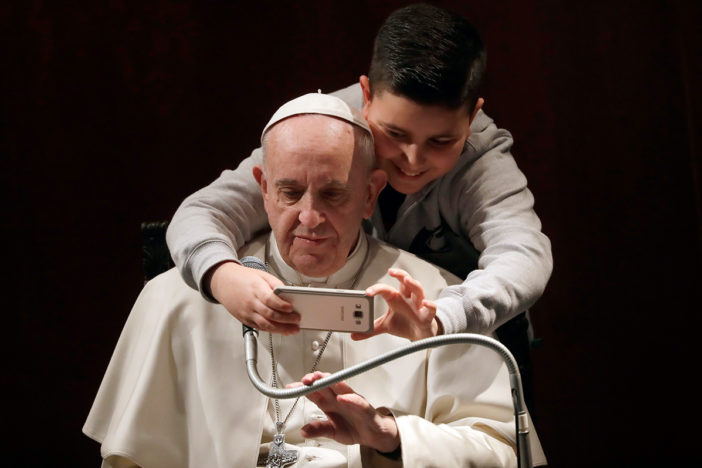Fratelli Tutti: a new culture from communication

The eight chapters of Fratelli Tutti contain, to date, the most radical claims that Pope Francis has made on certain issues. Once again, like five years ago in Laudato Si ' , the pontiff resorts to an expression of the Poor of Assisi to synthesize his message: the vision of all the brothers living together in fraternity and peace. It is also the Pope's most political and social encyclical, the hardest when describing and denouncing current injustices, and also a prophetic call on the consequences of the pandemic, the dark side of the networks and the unacceptable situation that he lives today. —In terms of poverty, inequality, oppression, and war — the human family.
Fratelli Tutti is a kind of climax to the concerns that Pope Francis had presented in his two previous encyclicals. Like you, the new letter is also addressed to all people of good will, open to dialogue and the construction of a more fraternal reality. His proposals, in addition to being of interest to those who are concerned about the global situation, are of fundamental interest to those who are dedicated to communications and culture.
Pope Francis starts from our daily absurdities - the "shadows of a closed world" - resulting from the lack of dialogue and the consideration of the other as a disposable object or, in the best of cases, a product to be offered, sold or euthanized. The death of every attempt at integration between nations, the migratory chaos and violence have their counterpart in that other dimension, the digital and media, which is a whole culture and an almost physical space.
All this has an enormous impact on the individual, especially the young, forced to despise their own history and reject their spirituality at the hands of "ideologies of different colors" (13). In the reconstruction of our memory, communication plays an essential role: it is in the field of social networks, of increasingly global interconnection, in the dissolution of the boundaries of public and private, where the battle for human dignity and its inalienable rights.

The old words - democracy, freedom, justice, unity - have been emptied and worn out by continuous tampering (14), and politics is more a game of marketing or populism than a sincere bet on the people.
Faced with so much difficulty for man to find - even himself - the Pope proposes us the path of dialogue, respect and the recovery of interior space, so as not to give in to the "illusion of communication": "Everything becomes a species show that can be spied on, watched, and life is exposed to constant control. In digital communication you want to show everything and each individual becomes the object of gazes that rummage, undress and disclose, often anonymously. Respect for the other is shattered and, in this way, at the same time that I displace him, I ignore him and keep him away, without any shame I can invade his life to the extreme »(42).
In one of the most lucid paragraphs of Fratelli Tutti , the Pope exposes the essence of our dilemma in a world increasingly dependent on the internet: “Physical gestures, facial expressions, silences, body language, and even perfume, the trembling of the hands, the blush, the perspiration, because all that speaks and is part of human communication. Digital relationships, which exempt the laborious cultivation of friendship, stable reciprocity, and even a consensus that matures over time, have the appearance of sociability. They do not truly build an "us" but tend to conceal and amplify the same individualism that is expressed in xenophobia and in the contempt of the weak. The digital connection is not enough to build bridges, it is not enough to unite humanity »(43).
They are councils from which Catholic circles are not left out, also susceptible to "losing limits" and "naturalizing defamation and slander", in situations where "all ethics and respect for the fame of others seem to be excluded" (46).
The Pope warns us against information without wisdom, the flow of texts and images that scroll on the screens of devices and that, often, anesthetize us against violence and war. The habit of witnessing digital aggression is so ingrained that we are no longer sensitive to what was once a matter of scandal or horror.
Becoming aware of these phenomena, studying them and reporting them, is the starting point to build a culture of a different communication, oriented towards peace and truth, that combats false news and manipulated information. A culture of dialogue, where freedom is not "navigating on a screen" (50) but the construction of a society open to the voice of the other, even when it contradicts or disagrees.
When the roots of the individual are healed, the culture of the encounter will bear fruit in the citizen, social and international sphere. It will be the basis for a more considerate diplomacy aimed at the common good, where religions of different projections are able to communicate and build peace. It is not about an unfounded utopia —like those that failed in the last century— but about a concrete proposal for a better future, or perhaps for the only possible future, if annihilation by natural disasters, war and violence is not wanted. the nuclear race.
The sixth chapter of Fratelli Tutti is devoted entirely to the culture of dialogue, to the need to reform the way we communicate and live together.
The Pope's conclusion is sudden and offers much light to those who have the task of communicating: “You have to get used to unmasking the various ways of tampering with, disfiguring and concealing the truth in public and private spheres. What we call "truth" is not only the dissemination of facts that journalism carries out. It is above all the search for the most solid foundations that are behind our options and also our laws. This means accepting that human intelligence can go beyond the conveniences of the moment and grasp some truths that do not change, that were true before us and will always be. Investigating human nature, reason discovers values that are universal, because they derive from it ”(208).
If the respectful encounter, the serene dialogue that aspires to a consensus, becomes a systematic practice, then the communication of peace as a culture is woven, as an idea deeply rooted in the heart of the human being. This is the foundation of the fraternity with which - in an imperfect, hurt and diverse world like ours - Pope Francis has dreamed again in his new encyclical, about the tomb of the Poor of Assisi.
Brief analytical index for those who wish to quickly access, in the text of the encyclical, the paragraphs related to the communicative and digital universe.
Communication - 42, 43, 47, 48, 49, 114, 156, 199, 205, 266.
Media - 43, 46, 52, 114, 156, 166, 199, 201, 205, 266.
Networks - 45, 47, 52, 200, 205.
Internet - 46, 50, 205






